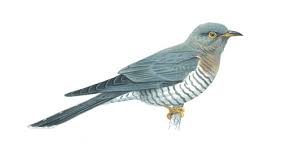记忆方法
将“cuckoo”与“cuck”联系,想象一个声音模仿的“cuck”不断重复,形成这种鸟特有的“咕咕”叫声,帮助记忆“cuckoo”是指 cuckoo 鸟。
以上内容由AI生成, 仅供参考和借鉴
中文词源
cuckoo 布谷鸟
拟声词,模仿布谷鸟的叫声。
英语词源
- cuckoo
-
cuckoo: [13] So distinctive is the cuckoo’s call that it is not always clear whether the names for the bird in various languages, based on the call, owe their similarity to borrowing or coincidence – Dutch, for instance, has koekoek, Russian kukúshka, Latin cuculus, and Greek kókkūx. In the case of English cuckoo, it seems to have been borrowed from Old French cucu, which was of imitative origin. Its first appearance is in the famous Cuckoo song of the late 13th century (‘Sumer is icumen in, lhude sing, cuccu!’), where it replaced the native Middle English word yeke (from Old English gēac, also of imitative origin).
- cuckoo (n.)
- mid-13c., from Old French cocu "cuckoo," also "cuckold," echoic of the male bird's mating cry (compare Greek kokkyx, Latin cuculus, Middle Irish cuach, Sanskrit kokilas). Slang adjectival sense of "crazy" is American English, 1918, but noun meaning "stupid person" is recorded by 1580s, perhaps from the bird's unvarying, oft-repeated call. The Old English name was geac, cognate with Old Norse gaukr, source of Scottish and northern English gowk. The Germanic words presumably originally were echoic, too, but had drifted in form. Cuckoo clock is from 1789.
权威例句
- 1. I was living in cloud-cuckoo-land about my salary expectations.
- 我对自己的薪水充满了不切实际的幻想。
- 2. The cuckoo lays its eggs in other birds'nests.
- 杜鹃在别的鸟巢中产卵.
- 3. In England the cuckoo is the herald of spring.
- 在英国杜鹃鸟是报春的使者.
- 4. The cuckoo is a harbinger of spring.
- 布谷鸟预告春天的来临.
- 5. The cuckoo is the herald of spring.
- 杜鹃鸟预告春天的来临.

